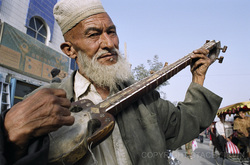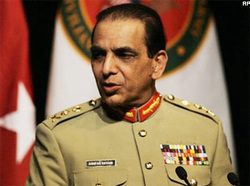 Pic courtesy: Stacey Irwin China's Communist Party has just finished its 18th annual congress, with the election of a new leader. "National unity and social harmony" were the themes of the event. It appears Chinese authorities are keen to make sure that nasty issues such as demands for freedom and independence don't disrupt the economic growth of the country. One ethnic group that has been affected by this are the Uighurs, one of the key players in The Anza Deception. How far should a country go in preserving its territorial integrity, vis-a-vis suppressing a people's desire for self-expression? This is a difficult issue, and one to which there are no easy answers. The Chinese have traditionally been rather ham-fisted in dealing with such movements. In the media environment of the 21st century, traditional approaches of relocating non-ethnic (in this case Han) populations to ethnic areas, or of teaching only the national language, history and culture in schools, have a high probability of backfiring. New and sensitive approaches are needed to integrate these communities into the national fabric while allowing them to preserve their unique identity. They must not feel threatened, must be given a voice in their own (and national) affairs, and must see a positive upside to being part of a larger country. Find out more about the Uighurs here: http://en.wikipedia.org/wiki/Uighur And about their struggle for self-determination and independence here: http://en.wikipedia.org/wiki/East_Turkestan_Islamic_Movement Parting shot: you could as well say the same thing about some of India's North-east states, or our tribal communities in the Maoist infested central Indian states.  Caught this gem in a Tehelka article on the recent judgments by the Pakistani Supreme Court concerning the 16-year-old case of Air Mashal Ashgar Khan: Gen Kayani [warned] the stakeholders to keep well within their constitutional limits. He talked about the army making mistakes in the past, but also reminded the people of being thoughtful at a time when the army was facing tough conditions vis-àvis national security. Wow. Talk about causing a chilling effect on the national dialogue. The case is a fascinating one: The Supreme Court has found a former army chief guilty of extorting money from a businessman, and then routing it through the ISI to rig the elections against Benazir Bhutto. The depth to which the tentacles of the army reach within Pakistani civil society just boggles the mind. But it begs another question: the Pakistani Army and the Indian Army were born from the same entity - the British Army in India. Why did that country take such a different path, whereas in India the Armed Forces have remained completely apolitical? Love to hear your thoughts. Caught this gem from rediff.com:
The sex scandal that has brought down CIA chief David Petraeus may be causing heartache in the Washington security establishment but the affair has prompted laughter among the Taliban. Petraeus resigned last week to pre-empt revelations of an affair with his married biographer Paula Broadwell, bringing to an end a glittering military career that included a spell commanding NATO forces fighting the Taliban in Afghanistan. A stony-faced Taliban official burst into laughter at the mention of the Petraeus affair during an interview with AFP in northwest Pakistan this week. "... But all Americans are the same, it's nothing new," the official said, who did not want to be named. The Islamists dealt harshly with adulterers during their brutal 1996-2001 rule in Afghanistan, dishing out public floggings for offenders. The traditional moral code of the Pashtuns, the main ethnic group the Taliban draw their members from, also demands severe punishment for adulterers. "From a Pashtun point of view, Petraeus should be shot by relatives from his mistress's family," the Taliban official explained. Well, I'm glad something got them to laugh. They were taking themselves too seriou How much does a leader's moral standing affect an army's (or nation's) efforts to win the "hearts and minds"? Quite a bit, I believe. Especially in developing countries, which tend to have more conservative cultures, a leader is one to be respected on all dimensions, including the moral dimension. Petraeus' affair diminishes his (and therefore the US's) moral standing. Major Raghavan writes:
"Slept at 2AM because could not put it down. Racy stuff like Forsyth. Congrats". Charan writes: "A good book and a fast paced read and a throwback to a genre that died with the cold war. Thank you for writing it. It reminded me about a lot of my favourite authors. Forsyth, Colin Forbes and Tom Clancy. Worth promoting as I do not think that there are many people writing about this conflict. Is there space for a series? The grandeur of the plot can actually justify a far longer book. Congratulations and lets do the marketing to ensure the book succeeds, the product is excellent." Have you read the book yet? What do you think? |
About meExecutive, entrepreneur, investor and mentor to social entrepreneurs, golf and squash addict, author of thrillers... In short, an amateur dabbler in new experiences, and provoker of thoughts. Archives
December 2020
Categories
All
|
Photo from SG2012
 RSS Feed
RSS Feed
